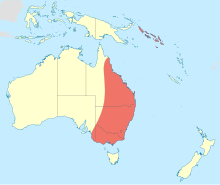Eusynthemis is a genus of dragonflies in the family Synthemistidae.[2] They are commonly known as tigertails. Species of this genus are found mostly in Australia[3] with one species, Eusynthemis frontalis, found in the Solomon Islands.[4]
| Eusynthemis | |
|---|---|

| |
| Eusynthemis nigra | |
| Scientific classification | |
| Domain: | Eukaryota |
| Kingdom: | Animalia |
| Phylum: | Arthropoda |
| Class: | Insecta |
| Order: | Odonata |
| Infraorder: | Anisoptera |
| Family: | Synthemistidae |
| Genus: | Eusynthemis Förster, 1903[1] |

| |
Species
editThe genus Eusynthemis includes these species:[5]
- Eusynthemis aurolineata (Tillyard, 1913) - variable tigertail[6]
- Eusynthemis barbarae (Moulds, 1985) - Mount Lewis tigertail[3]
- Eusynthemis brevistyla (Selys, 1871) - small tigertail[3]
- Eusynthemis cooloola Theischinger, 2018 - Cooloola tigertail[3]
- Eusynthemis deniseae Theischinger, 1977 - Carnarvon tigertail[3]
- Eusynthemis frontalis Lieftinck, 1949[4]
- Eusynthemis guttata (Selys, 1871) - southern tigertail[3]
- Eusynthemis netta Theischinger, 1999 - pretty tigertail[7]
- Eusynthemis nigra (Tillyard, 1906) - black tigertail[3]
- Eusynthemis rentziana Theischinger, 1998 - swift tigertail[3]
- Eusynthemis tenera Theischinger, 1995 - rainforest tigertail[3]
- Eusynthemis tillyardi Theischinger, 1995 - mountain tigertail[8]
- Eusynthemis ursa Theischinger, 1999 - Barrington tigertail[3]
- Eusynthemis ursula Theischinger, 1998 - beech tigertail[9]
- Eusynthemis virgula (Selys, 1874) - golden tigertail[3]
References
editWikimedia Commons has media related to Eusynthemis.
Wikispecies has information related to Eusynthemis.
- ^ Förster, F. (1903). "Odonaten aus Neu-Guinea III". Annales Historico-Naturales Musei Nationalis Hungarici (Zoologica). 1 (2): 509–554 [545] – via Annales historico-naturales Musei nationalis hungarici.
- ^ "Genus Eusynthemis Förster, 1903". Australian Faunal Directory. Australian Biological Resources Study. 2012. Retrieved 3 March 2017.
- ^ a b c d e f g h i j k Theischinger, Günther; Hawking, John; Orr, Albert (2021). The Complete Field Guide to Dragonflies of Australia (2nd ed.). Melbourne, Victoria, Australia: CSIRO Publishing. ISBN 978 1 48631 374 7.
- ^ a b Lieftinck, M.A. (1949). "Synopsis of the Odonate fauna of the Bismarck Archipelago and the Solomon Islands". Treubia. 20 (2): 319–374 [359].
- ^ Paulson, D.; Schorr, M.; Abbott, J.; Bota-Sierra, C.; Deliry, C.; Dijkstra, K.-D.; Lozano, F. (2024). "World Odonata List". OdonataCentral, University of Alabama.
- ^ Hawking, J. (2009). "Eusynthemis aurolineata". IUCN Red List of Threatened Species. 2009: e.T163579A5618499. doi:10.2305/IUCN.UK.2009-2.RLTS.T163579A5618499.en.
- ^ Hawking, J. (2009). "Eusynthemis netta". IUCN Red List of Threatened Species. 2009: e.T163560A5616186. doi:10.2305/IUCN.UK.2009-2.RLTS.T163560A5616186.en.
- ^ Hawking, J. (2009). "Eusynthemis tillyardi". IUCN Red List of Threatened Species. 2009: e.T163531A5612316. doi:10.2305/IUCN.UK.2009-2.RLTS.T163531A5612316.en.
- ^ Hawking, J. (2009). "Eusynthemis ursula". IUCN Red List of Threatened Species. 2009: e.T163569A5617241. doi:10.2305/IUCN.UK.2009-2.RLTS.T163569A5617241.en.